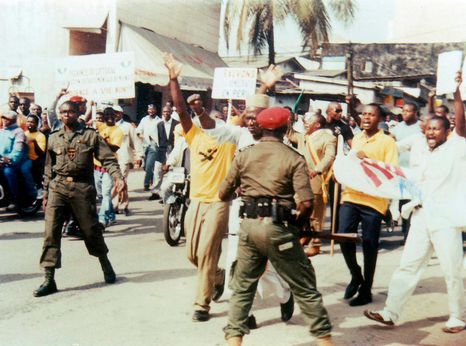Activist in need of urgent medical care

Repression of the opposition
On 26 January 2019, opposition party, Movement for the Renaissance of Cameroon (MRC) – the party of the candidate that came in second during the October 2018 presidential elections – called for public protests or “marches blanches” across the country, to contest the alleged mass irregularities that occurred during the electoral process.
In response to the unauthorised protests, security forces used excessive force against demonstrators. Seven people were shot and injured in the coastal city of Douala, while other protesters were beaten. A Government spokesperson denied the use of live ammunition against protesters, but sequences of automatic gunfire in Douala, and one of a riot police officer shooting at a protester’s legs, were shown on social media.
More than one hundred protesters were arrested in Douala, Yaoundé, Dschang, Bafoussam and Bafang. Approximately 50 were released the following day and the remaining protesters were placed under administrative custody. Opposition leader, Maurice Kamto, was arrested on 28 January 2019; and high-profile member of the party, lawyer, Michele Ndoki, was also arrested in February. They were charged alongside 130 other people with offences including rebellion, hostility against the nation, incitement to insurrection, and were sent to pre-trial detention.
In October 2019, following an order from President Paul Biya to release some opposition members arrested during the demonstrations, hundreds of political activists, including Maurice Kamto and Michele Ndoki, were released.
Serge Branco Nana could not benefit from this measure, because he was caught up in another case. On 22 July a riot was reported in Kondengui Prison in Yaoundé. According to reports, detained armed separatists from the Anglophone regions and opposition members took possession of the prison yard, denouncing overcrowding in the prison, judicial delays and deplorable conditions.
Serge Branco Nana, who was detained in that prison at the time, was accused of being among the initiators and sentenced to two years’ imprisonment, in August. Following the riot, he was taken from the prison and sent to the State Secretariat for Defence (SED), where he reportedly severely beaten for hours and his genitals electrocuted. He was then transferred to Mfou Prison, 30km from Yaounde and around 300km from the West region, making it very difficult for his family, relatives and lawyer to visit.
- Downloads
- Download in PDF
- Download in Word